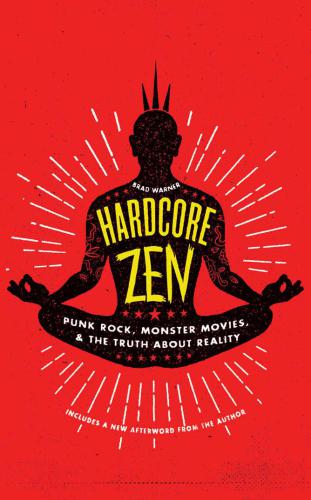
Hardcore Zen
Punk Rock, Monster Movies and the Truth About Reality
کتاب های مرتبط
- اطلاعات
- نقد و بررسی
- دیدگاه کاربران
نقد و بررسی

Starred review from July 14, 2003
There's a Zen story about a teacher who holds up his finger, then reminds his student to look beyond the finger itself, to what the finger is pointing at—the moon. That's what this book does: it transcends itself—and with outrageous style. Warner, an early-'80s hardcore punk musician, discovered Zen in college, moved to Japan to make B-grade monster movies, and eventually became a bona fide Zen master by formally receiving "dharma transmission." Yet true to his punk spirit, he relentlessly demands that all teaching, all beliefs, all authority—including his own—must be questioned. ("Why should you listen to me? Who the hell am I?... No one. No one at all.") By turns wickedly funny, profane, challenging and iconoclastic—but always with genuine kindness—Warner devotes chapters to some common Zen notions such as the oneness of reality ("Why Gene Simmons Is Not a Zen Master"), reincarnation ("In My Next Life I Want to Come Back as a Pair of Lucy Liu's Panties") and the vital importance of the present moment ("Eating a Tangerine is Real Enlightenment"). Yet this is no litany of Zen orthodoxy designed for study. By liberally sharing anecdotes from his own life as a down-and-out punk rocker and maker of monster movies, Warner constantly focuses on the importance of a direct experience of reality in all its rawness over adherence to any set of beliefs—even Zen ones. Entertaining, bold and refreshingly direct, this book is likely to change the way one experiences other books about Zen—and maybe even the way one experiences reality.

March 1, 2004
Adult/High School-Warner has appropriated the phrase "Question authority," a longtime battle cry for the punk-rock aesthetic, for use as a Buddhist mantra. Much of his book is laid out like a memoir. Readers follow the author from high school and his interest in '70s rock music and philosophical thought through his musical career under names like Zero Defex and Dimentia 13 and finally to his dream job with the Japanese television studio that produces the popular live-action children's show, Ultra Man. The common threads throughout are a rabid interest in transcendental meditation and enlightenment. A conversational tone and endless streams of pop references to everything from Minor Threat to The Matrix movies make this a readable and even fun book. Warner stresses that enlightenment and meditation do not come easy, which separates his writing dramatically from many other Western books on Buddhism. It's nice to see someone with strong ties to rock coming down so hard on people like Terence McKenna or even the Beatles, who promoted drug use as a way toward higher thought. Although some of Warner's connections between Buddhism and the various pieces of pop culture are simplified, his idea of questioning is particularly striking. Not just questioning authority, but friends, oneself, and, yes, him. This wonderfully engaging primer just might get those more dubious, less willing readers to look at the world a bit differently.-Matthew L. Moffett, Northern Virginia Community College, Annandale
Copyright 2004 School Library Journal, LLC Used with permission.

September 1, 2003
The last thing Buddha reportedly told his followers was to question authority, which is something Warner, as bass player in an Ohio hardcore band and later a toiler on Japanese B-movies, could relate to. Oh, he studied with a Zen master in Japan, too, but pretty obviously, he isn't your typical Buddhist priest, and " Hardcore Zen" isn't your typical Buddhist book. Warner brings the same tough, skeptical attitude to Zen that he brought to punk rock. He asserts that nothing is sacred, and doubt in everything is essential. He believes, though, that everything is sacred, even while maintaining that everything is profane. He admits his attitudes can all get rather confusing. Certain things, however, are clear: Buddhism stresses the here and now, and the paradise you seek all your life is right in front of you. Profane and sometimes irrelevant; capable of devastating, corrosive humor; offering nothing gentle or conventionally reassuring, Warner pulls no punches. His book is an honest account of his search for truth.(Reprinted with permission of Booklist, copyright 2003, American Library Association.)

























دیدگاه کاربران